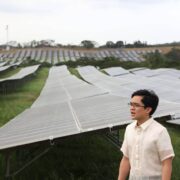Converge sets data center switch-on in March

Converge ICT Solution Inc. is set to operate within this first quarter its new data center in Caloocan City, which is seen supporting the firm’s growing need for a hub that houses critical digital infrastructure.
Dennis Anthony Uy, Converge CEO and co-founder, said in a statement on Wednesday they were eyeing to bring the data center online by March.
The Caloocan data center, designed to accommodate 300 racks, will serve the internet service provider’s operational needs.
“As digital demands continue to grow, we are dedicated to creating a robust digital ecosystem that can cater to our operations with the highest levels of reliability. That way, we are poised to offer services that will empower our customers in the digital age,” Converge chief network transformation officer Paulo Martin Santos said.
The company noted that, in building this data hub, Converge secured a Tier III certification for the design, which means that the facility was “able to meet stringent design standards” for redundancy, maintainability and uptime reliability.
“Only a few data centers in the Philippines hold Tier III certification. With this accreditation, we are moving full speed ahead toward having a top-tier digital hub,” Uy said.
Converge, which has about 10 megawatts in existing data center capacity, is working with American tech giant Super Micro Computer Inc. for the construction of such facilities.
The listed company will be installing Supermicro’s liquid cooling solution in its servers to reduce energy consumption by up to 40 percent. This will not only result in less environmental impact, but will also cut operational expenses.
Earlier, Uy said they had intended to spend P6 billion to P7 billion annually to build up its data center capacity.
Along with this, Converge is on track to activate the Southeast Asia Hainan-Hong Kong Express (SEA-H2X) fiber cable system this year.
The 5,000-kilometer (km) submarine cable project, which has a design capacity of 160 terabits per second (Tbps), traverses six markets including Hong Kong, China, Thailand, East Malaysia and Singapore.
The internet service provider is also part of a consortium that is building the 15,000-km BiFrost Cable System, which will connect the Philippines to Singapore, Indonesia, Guam and the west coast of North America.
This project, which has a capacity of up to 15 Tbps, is targeted to be finished by this year.





















